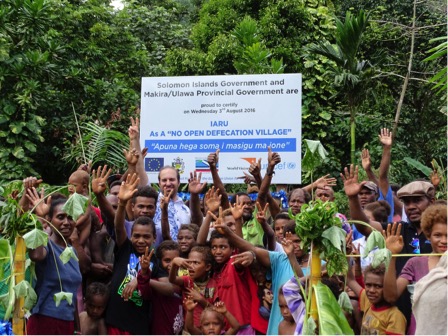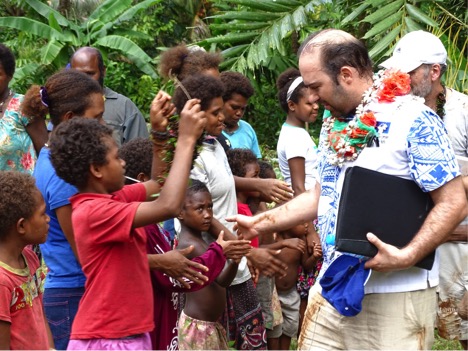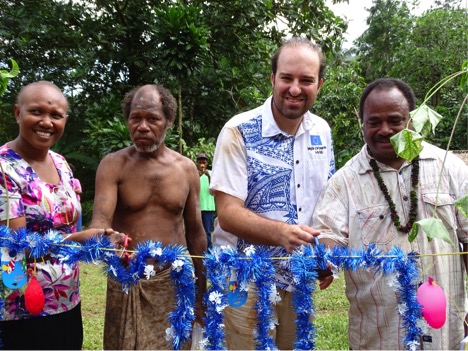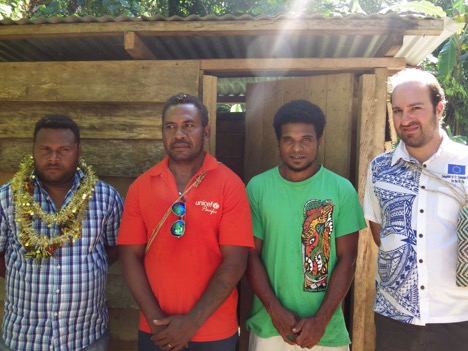Open Defecation Free Celebration for Solomon Islands Communities
Iaru and Ra’a communities in Makira province earned their ‘No Open Defecation’ (NOD) certification earlier this week, amidst well-deserved celebrations. This brings the number of certified communities in the country to three, following celebrations in Tiratonna, Isabel province last month.
EU Chargé d’Affaires Pavlos Evangelidis with community members after
the unveiling of Iaru NOD sign board.
In July the Solomon Islands Ministry of Health and Medical Services (MHMS) verified that all households in Ra’a and Iaru have a toilet, a hand washing facility and that everyone is now using the toilets for defecation while constantly practicing hand washing before eating and after using the toilet.
These positive improvements are thanks to the European Union (EU)-funded ‘Improving Water, Sanitation and Hygiene (IWASH)’ project, which was implemented by UNICEF in partnership with World Vision. The project supports efforts by MHMS to provide safe drinking water, and promotes improved sanitation and good hygiene in rural areas.
The EU Chargé d'Affaires a.i. to Solomon Islands and Vanuatu, Pavlos Evangelidis, who attended the celebrations in Makira commended the communities of Ra’a and Iaru, for their achievement:
"The EU has committed about SBD$400 million for the Water supply, Sanitation and Hygiene (WASH) sector across the Solomon Islands. However, money alone would have had little impact, if it was not for the hard work of the communities, supported by our partners UNICEF and World Vision. This is indeed a Community-Led Total Sanitation programme. It has been the people of Iaru and Ra'a who run the show, who built the toilets, who worked hard to learn, change their behaviours and become the advocates of good public health. It is therefore a privilege to attend your celebrations and congratulate you, on behalf of the EU for becoming pioneers of good public health.”
He added that work does not stop here. “89% of your brothers and sisters in Makira still do not know the benefits of improved sanitation, so please help by sharing your stories to generate demand and drive progress to more villages. And the EU will remain your partner in this, and will continue to provide support. It is, nonetheless, the hard work of the communities that will make it count!"
EU Chargé D'Affaires, Pavlos Evangelidis greeted by the Ra’a community.
Erick Hale, UNICEF National WASH Officer, stated that diseases related to water, sanitation and hygiene are one of the major causes of death, especially in children under five. “The recent national Rural Water Sanitation and Hygiene (RWASH) baseline survey showed that 80 percent of the total population continue to defecate in the open. Therefore, work by the communities in constructing basic toilets and constant good hygiene practices is even more crucial for the survival and healthy development of children and the wider community.”
(from right to left) Makira’s Deputy Premier Hypolite Tarimae, EU Chargé
d’Affaires Pavlos Evangelidis, Community Chief, World Vision staff Judith Kaki
during the ribbon cutting ceremony to officially open use of pit latrines.
A key part of the project has been to improve the knowledge of community members on the health risks posed by open defecation. This is carried out using the Community-Led Total Sanitation (CLTS) approach, which aims to help communities find their own solutions to their sanitation needs.
“We saw that once the communities in Ra'a and Iaru, understood the risks, they were the ones building the toilets to improve sanitation,” said World Vision Country Director Janes Ginting.
“A WASH Project is often difficult as it involves improving awareness around water, hygiene and sanitation; mobilizing community participation in the construction of wash facilities; the procurement and transport of materials to remote areas of Makira and the setup of the WASH Committee as a key pillar for sustainability. The fact that we are able to help communities reach NOD status is a truly remarkable achievement.”
Mr Ginting said he was pleased that World Vision was able to help provide water and sanitation to some of the hardest to reach and most vulnerable communities in Solomon Islands.
(From right to left) EU Chargé d'Affaires Pavlos Evangelidis, Chairman of
WASH committee- Ra’a village, Erick Hale UNICEF National WASH officer,
Paul Amao World Vision’s WASH sector Coordinator after inspecting one of
the completed pit latrine.



